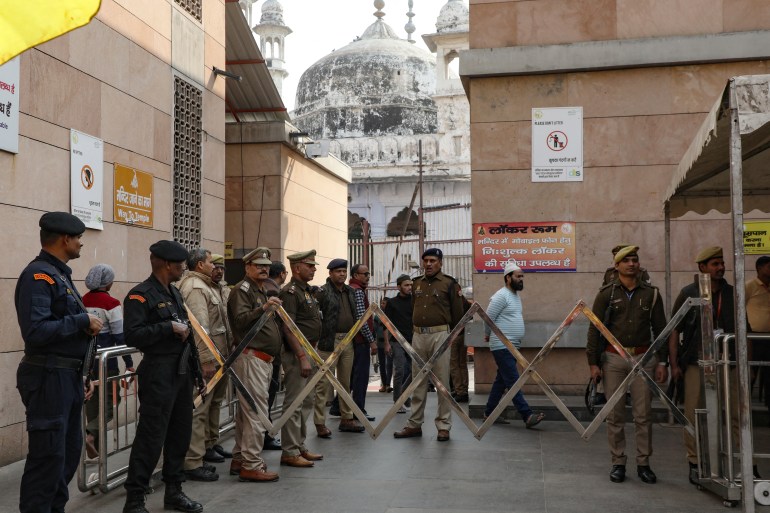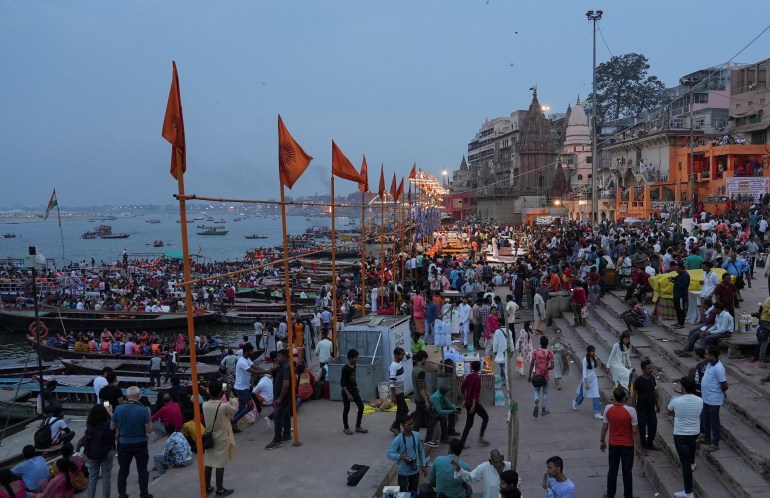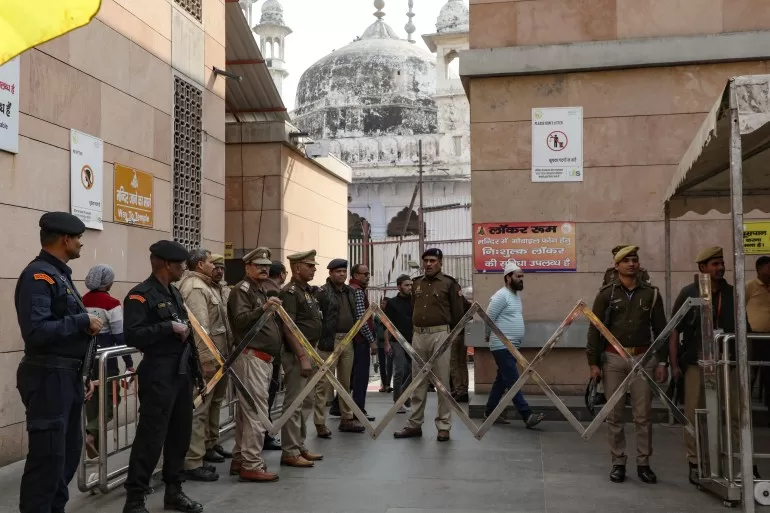It was the week Prime Minister Narendra Modi had inaugurated the new temple to the Hindu deity Ram where the 16th century Babri Masjid once stood in the city of Ayodhya, 200km (124 miles) to the north.
In Varanasi, the streets and boats on the river were decked up with saffron flags bearing illustrations of Ram. Outside Varanasi’s famous and historic Kashi Vishwanath temple, the smell of burning camphor and the sound of Indian classical music drifted through the air as pilgrims flocked in large numbers to the temple to offer their prayers.
But next door, towards the west of the temple, the carnival-like spirit was replaced with a strict and sombre atmosphere, with barricades and police officers greeting crowds.
The officers were guarding the Gyanvapi Mosque – which is widely believed to have been built on the ruins of a 16th-century Kashi Vishwanath temple demolished by Mughal emperor Aurangzeb in 1669.
While the partially ruined Kashi temple has been reconstructed and stands adjacent to the Gyanvapi Mosque, Hindu supremacist groups have been trying to reclaim the mosque for decades.

In May 2022, some Hindu patrons went to the Varanasi local court asking for permission to worship within the mosque’s complex after a court-ordered video survey found that a ‘Shivling’ – a symbol of the Hindu deity Shiva – was found near the wuzukhana, a well used by Muslim devotees at the mosque.
This case gained momentum in January this year when a survey from the Archaeological Survey of India (ASI), among other things, stated that a large Hindu temple existed on the site before the mosque and that sculptures of Hindu deities were also present in the cellars of the mosque.
Within a few days, on January 31, Judge Ajaya Krishna Vishvesha from Varanasi’s local court passed an order ruling that Hindus would be allowed to pray in the mosque’s basement – a section which had been sealed due to security concerns.
“District court Varanasi has created history today,” Vishnu Jain, a Supreme Court lawyer representing the Hindu side said in a post on X.
A day later, videos and images began appearing on social media of a priest offering prayers to the Hindu deities inside the mosque cellar.
#WATCH | A priest offers prayers at ‘Vyas Ji ka Tehkhana’ inside Gyanvapi mosque in Varanasi, after District court order.
Visuals confirmed by Vishnu Shankar Jain, the lawyer for the Hindu side in the Gyanvapi case pic.twitter.com/mUB6TMGpET
— ANI (@ANI) February 1, 2024
The Anjuman Intezamia Masajid, the committee managing the Gyanvapi Mosque, rejected the local court’s order and is scheduled to challenge the case at the Allahabad High Court in the city of Prayagraj, formerly known as Allahabad, on February 6.
“It seems like the judicial system is against Muslims,” Rais Ahmad Ansari, an advocate in Varanasi representing the Muslim side, told Al Jazeera.
Even amid a heightened momentum among India’s Hindu supremacist movement to target mosques, often facilitated by government authorities – a centuries-old mosque was razed in New Delhi last week – the case involving the Gyanyavi structure holds deep political significance. Varanasi is the electoral constituency of Modi, who leads the Hindu majoritarian Bharatiya Janata Party (BJP) that rules the country, yet has built strong relations with the presidents and ministers of Western liberal democracies.
India will vote in general elections expected to be held between March and May.
‘You can feel a Hindu vibe all around you’
While the court order hasn’t stirred any violence or communal riots, a sense of anxiety is prevalent in the Muslim neighbourhoods of the city, according to advocate Ansari.
“Muslim-owned shops closed after the [January 31] hearing fearing a dispute. Friday’s namaz [prayers] was also greeted with tight security presence as hundreds gathered outside the Gynavapi Mosque to offer prayers. There is a sense of anxiety in every Muslim’s mind,” he said.
“It is still peaceful in Varanasi. But this peace feels uneasy,” he added.
Meanwhile, some news channels in the country hailed the local court order and the onset of prayers in the mosque as “a big win for Hindus” – a sentiment shared by several Hindus in Varanasi.
“We plan to go visit the site and see the priest performing rituals at the mosque as soon as our exams end,” Ayush Akash and Harshit Sharma, two 21-year-old political science students at the Banaras Hindu University (BHU), told Al Jazeera.
Nita*, a Hindu devotee at the Kashi Vishwanath temple, was also keen to pray at the temple.
“We feel great about it [court ruling]. If we are let to visit and pray, we will go. When Hindus pray in Varanasi, they have their own places of worship. My brother is a priest and can only worship in his temple. But if the priest allows us into Gyanvapi, we will surely go,” she told Al Jazeera.
“People here have been going crazy since the inauguration of the Ayodhya temple,” Nita said.
“You can feel a Hindu vibe all around you on the streets. It was never like this before, but everybody is happy about things that are happening and that the Gyanvapi is a Hindu temple,” she added.

BHU’s Akash pointed out that people from all religions in Varanasi have coexisted peacefully for years and are mature enough not to riot over the temple-mosque dispute.
“It might look like Hindus are in power, and yes, some Muslim people might be unhappy about the local court’s decision on the Gyanvapi Mosque. But in this city, while ideologies do differ, it doesn’t stop Hindu-Muslim friendship. That’s how the real Varanasi is,” he said.
‘All about politics’
Since Modi came to power in 2014, critics and rights groups have accused his government of encouraging or facilitating a rise in Hindu supremacy, while instances of discrimination and violence against Muslims – who represent the largest religious minority in the country – have grown.
Hindu nationalist groups have also increasingly launched or intensified legal campaigns against several centuries-old mosques, claiming they are built on the remains of Hindu shrines.
“There is a slogan which Hindu nationalists have been using which says ‘Ayodhya Jhaki hain, Kashi-Mathura Baki Hain,’” said BHU’s Akash. Translated, the slogan says ‘Ayodhya is just a preview, Kashi [Varanasi] and Mathura are left’. It’s a reference to how the demolition of the Babri Masjid in 1992 in Ayodhya has been used by Hindu majoritarian groups to seek similar actions with the Mughal-era mosques in Varanasi and Mathura.
“But right now, in Varanasi, the Gyanvapi case is all about politics. It seems like the local court gave its ruling in time for the upcoming general elections. I feel the ruling is to unite Hindus before the elections,” he said.
Syed Ali Nadeem Rezavi, secretary of the Indian History Congress and professor of medieval history at the Aligarh Muslim University (AMU) shared a similar view but highlighted that this case is not like Ayodhya.
“Nobody has ever said that where the Gyanvapi Mosque stands today, there had been no temple. It is clear there was a temple and it was demolished. One can even see that with the naked eye,” Rezawi said.
“The reason behind why the temple was broken is where the contention arises since the manner in which the history of temple demolitions is currently being presented is a false narrative.”
Rezawi highlighted how the book, Temple Desecration and Muslim States in Medieval India, written by American scholar Richard Eaton, explains that in pre-colonial India, every dynasty had a deity they prayed to. If the ruler of the dynasty was defeated and the kingdom was taken over, then the deity and everything devoted to the deity – including the temple – was destroyed by the triumphant ruler.
“This was an accepted practice among kings and is exactly what [the emperor] Aurangzeb did. But the reason behind why he demolished the Vishwanath temple and built the mosque has many theories with some historians saying it was due to religious reasons and others claiming it was Aurangzeb’s way of punishing the Hindu family who managed the mosque since they had helped the Hindu king Shivaji escape,” he added.
“What Aurangzeb did should be condemned. But he lived during an era when there was no constitution. We have an Indian constitution which guarantees certain rights to people. So I don’t understand why the courts and prime minister are ignoring this and committing a crime more heinous than Aurangzeb,” Rezwai said.
Constitutionally, India is a secular state. The country also passed a law in 1991 called the Places of Worship Act, which prohibits the conversion of places of worship and stresses that their religious nature should be maintained.
But the final say about the future of the mosque lies with the country’s courts.
Abhishek Sharma, a Kashi temple devotee and coordinator at the Swagatam Kashi Foundation, told Al Jazeera that “people in Varanasi believe in ‘Ganga-Jamuna tehzeeb’,” a metaphor for social harmony that references the mingling of the waters of the Ganga and Yamuna rivers.
“We have always believed in living together in sanctity. We pray that this peace is not be disturbed in any way,” he said.
*Some names have been changed to protect identities.
